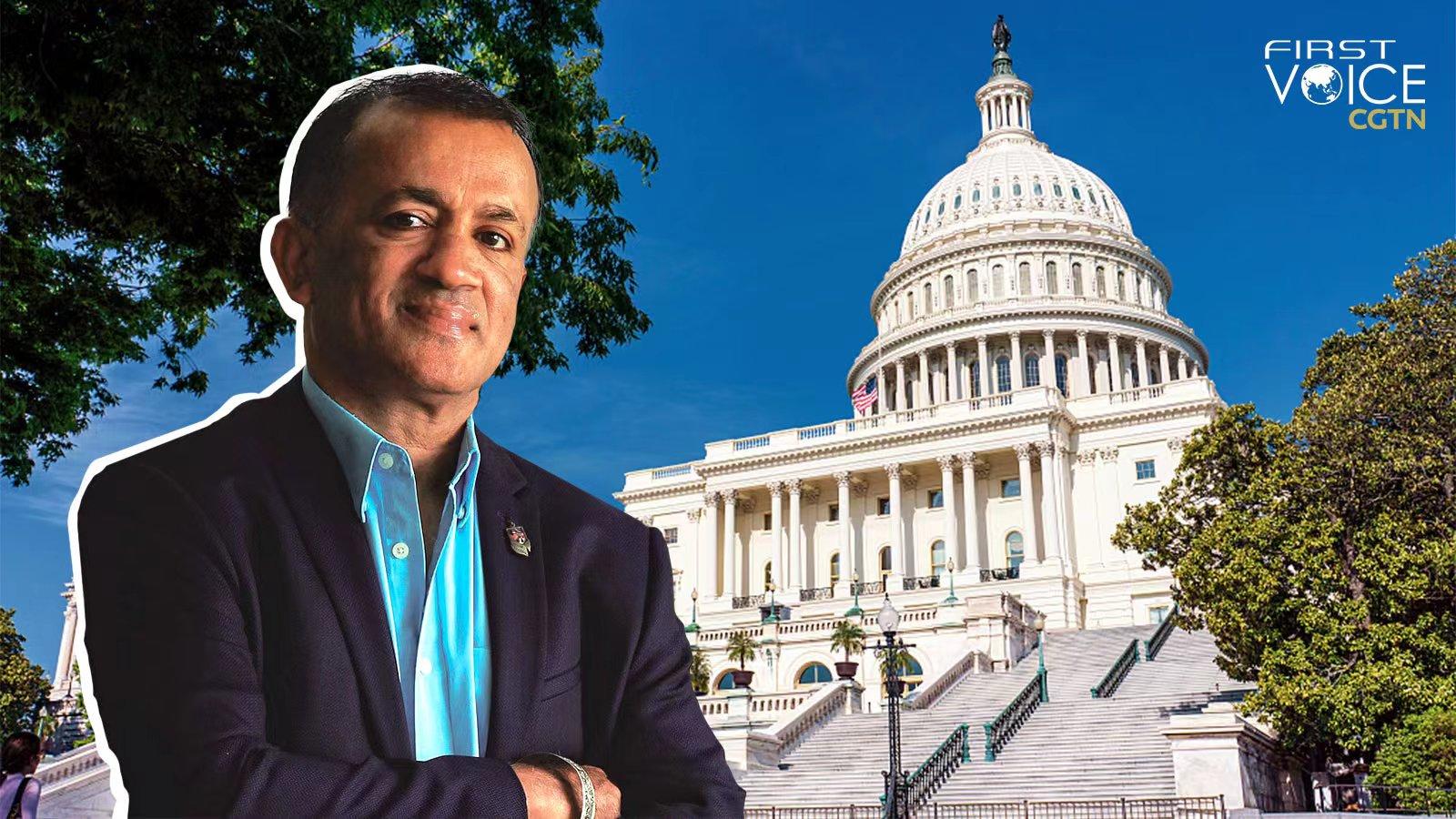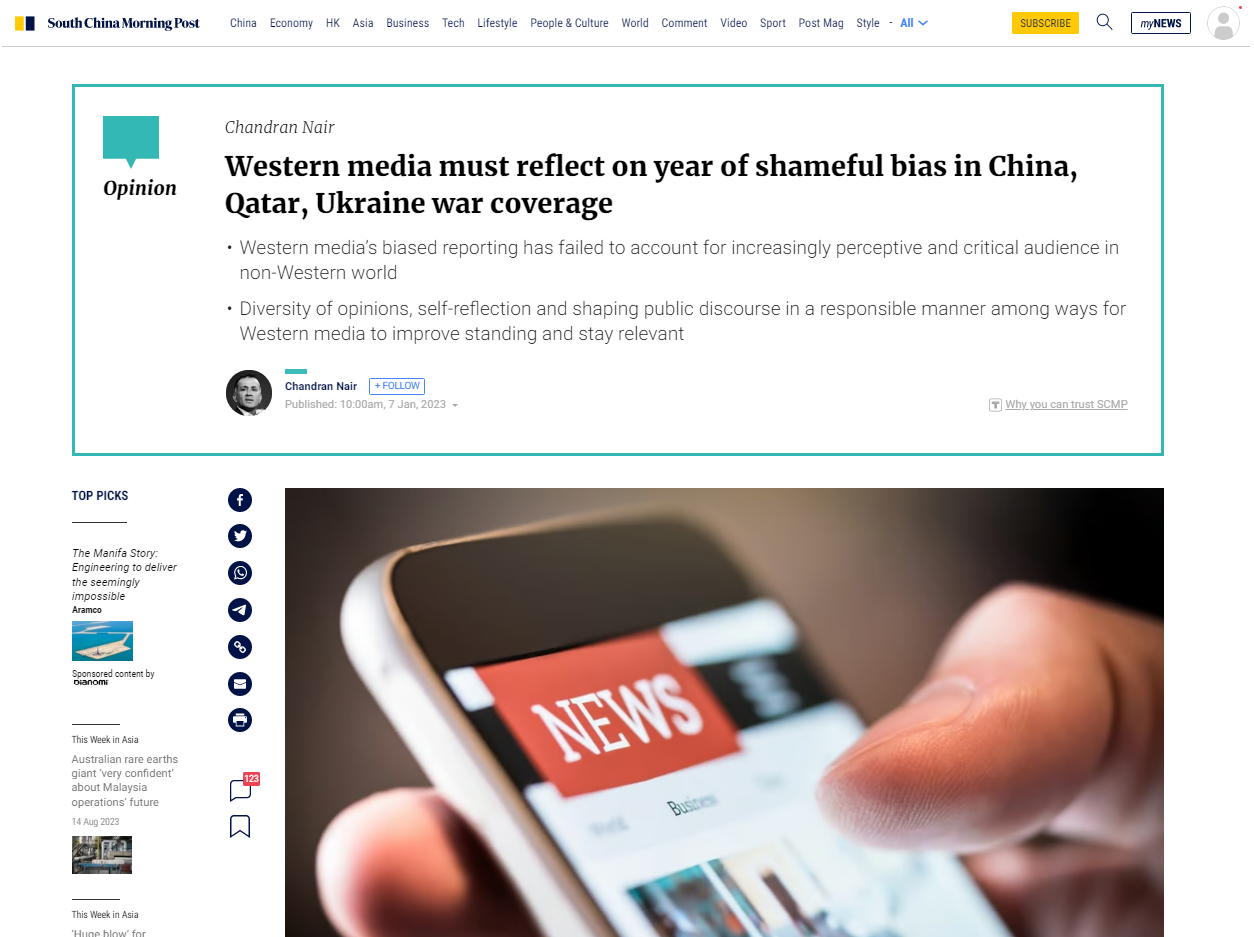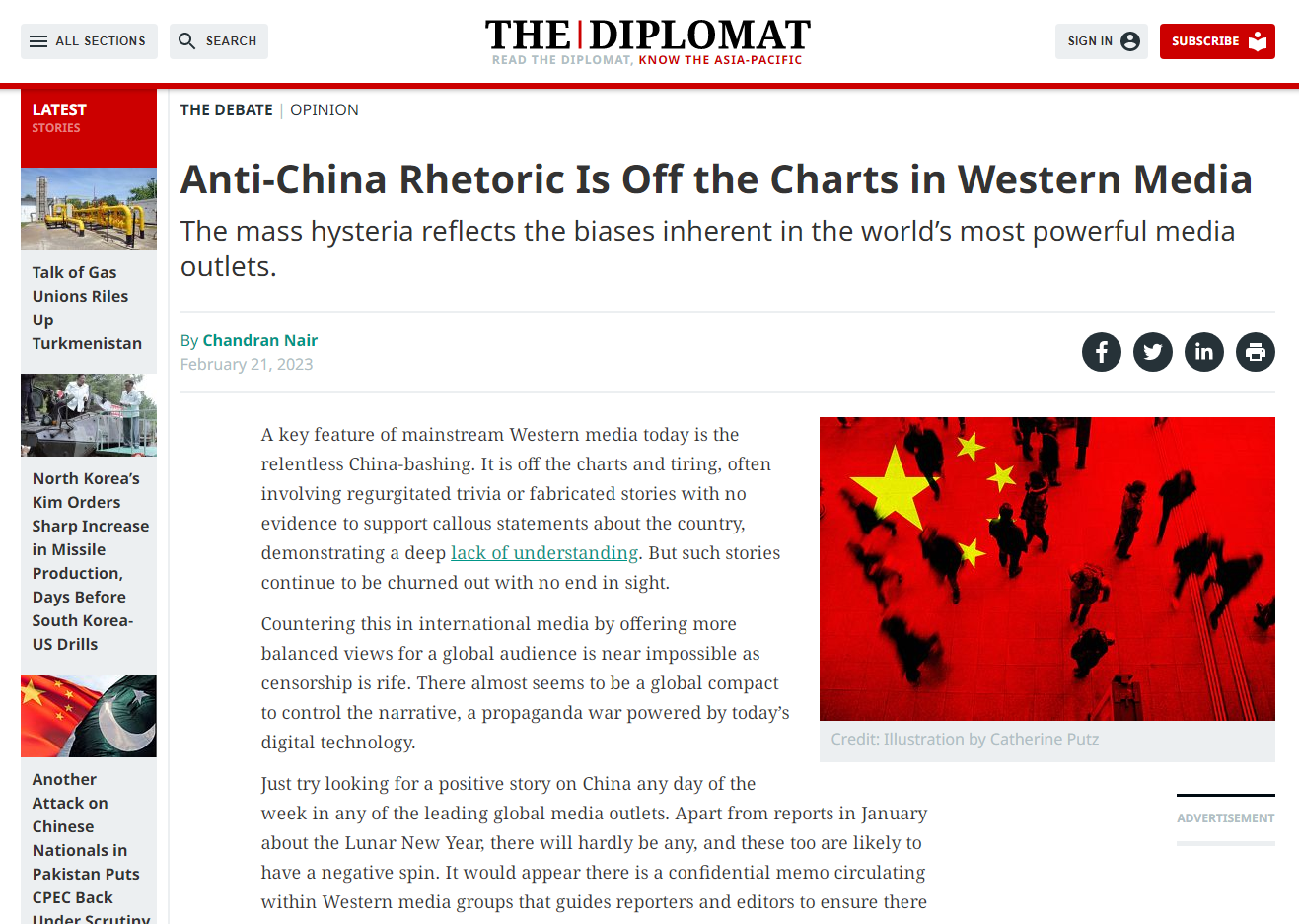
Chandran Nair is the Founder and CEO of the Global Institute for Tomorrow, a Hong Kong-based independent think tank, and the author of the book Dismantling Global White Privilege: Equity for a Post-Western World, published in 2022. Nair has written multiple commentaries for South China Morning Post and The Diplomat this year, exposing racism and "white privilege" thinking in certain media reporting, which is subservient to political and commercial interests, implying biases against the developing world.
In an exclusive interview with CGTN, Nair shared more of his thoughts in this regard. The following is an excerpt from our interview.
CGTN: Your article titled "Western media must reflect on year of shameful bias in China, Qatar, Ukraine war coverage" was published by South China Morning Post in January. What are the biases you've seen in Western media coverage?
Nair: There are so many examples, but two or three examples that triggered me writing that article started with the coverage of the World Cup in Qatar and the relentless efforts to undermine the World Cup solidarity that brings nations together.

A screenshot of Chandran Nair's article titled "Western media must reflect on year of shameful bias in China, Qatar, Ukraine war coverage" published by South China Morning Post.
Clearly, no country is perfect as Qatar has its sorts of issues, but the West's attacks on non-Westerners have become a pattern. The same thing happened during the 2008 Beijing Olympics.
Another example was the unfortunate and tragic war in Ukraine. Rather than allowing global audiences to understand the history and the complexities, it was one-sided that there are the bad guys and the good guys. "We [The West] are on the side of the good guys, as if the rest of the world is ignorant of history."
I was particularly taken by my observation that the Western media was quick to jump to accusations about war crimes being committed. If that's the case, why weren't the same accusations leveled against the Americans in Iraq and Afghanistan?
Now we have the Americans sending cluster bombs, but there was almost no coverage from the Western media on it. The same is true of Western media attacks on China considering their absurd accusations of "genocide" in Xinjiang Uygur Autonomous Region and the COVID-19 pandemic.
CGTN: Are Western journalists purposefully aligning with the political elites on international issues?
Nair: Living in Hong Kong, I know many working for the leading Western media outlets, who conceded privately that they can't speak the truth anymore. "You have to follow the money," as they say, and "look at ownership." Ownership dictates essentially what the business model looks like. Ownership dictates who they see as the audience.
But Western media needs to understand the world isn't made up. The majority of the world aren't Westerners. If you have a business, you might want to become more business savvy, understanding that 85 percent of the world doesn't dance to your tune, so you might want to give them more balanced perspectives.
Working for media giants, most editors in the West have their political stances, and seek legitimacy and proximity to power, but if you're critical of the White House, you won't get invited to their press conferences.
It's just human nature. If you tell cigarette sellers that you need to disown this industry because it causes cancer, they will find legitimate ways of arguing that cigarettes are good for you. Journalists are no different. They have to pay the rent, making money by essentially knowing where power resides. They have to appease their masters.
CGTN: But almost on a daily basis, criticism of their government, Congress and officials, as an important part of their reporting, has been seen in Western media such as CNN, FOX, New York Times and the Washington Post. Is criticism simply a hallmark of Western journalism?
Nair: In the U.S., the UK and other Western countries, where journalists are critical of politicians, let's also clear that too. They take sides, with one part in the U.S. pro-Democrat and one pro-Republican, who has a little squabble with the other all the time.
Pro-Democrat media won't question President Joe Biden as there's no discussion that he is getting too old, or appears to be suffering from ailments, but they attack Donald Trump. We can all have our views about the two presidents, but it's divided, and people are entitled to that view in the U.S.
When it comes to the enemies of the West, American journalists, however, seem to all be united, criticizing that "China is bad. Russia is bad. Iran is bad." That's the geopolitical unification of Western media, which is biased, which we need to challenge.
Why are they ignited when it comes to geopolitical issues and don't challenge their own governments? The reason is that whoever is in charge won't invite you to their tea parties, which is interesting.
CGTN: In another article titled "Anti-China rhetoric is off the charts in Western media" published by The Diplomat on February 21, you highlighted that a key feature of mainstream Western media is the relentless China-bashing, adhering to the core idea that China is a threat to the world, which must be linked to every possible global event that affects the West. Could you tell us more about your observation?

A screenshot of Chandran Nair's article titled "Anti-China rhetoric is off the charts in Western media" published by The Diplomat.
Nair: As a Hong Konger for over 25 years, I started to notice that during the 2008 Beijing Olympics, which was an opportunity for the world to welcome China but it became one in which China was heavily criticized.
The bashing then went on the radar over the last five or six years. The motivation is very simple. At one level, it's rooted in the exceptionalism of the American view that we are the only ones that can be number one. That exceptionalism is also rooted in racism that others cannot be at the same table with us, which is also the cause for xenophobia and the "yellow peril."
This exceptionalism is aimed at the retention of economic power, as I speak about in my book Dismantling Global White Privilege: Equity for a Post-Western World. Colonization is about extracting wealth and having hegemony in terms of economic power. Today, the troops are off the ground, but other instruments of power, including globalization and a world order based on Western rules, are used to dominate others. That's why as China rises and poses a "threat" in terms of economic power and political influence around the world, the Western media and the governments have come together, which relentlessly bash China.

 中文
中文



